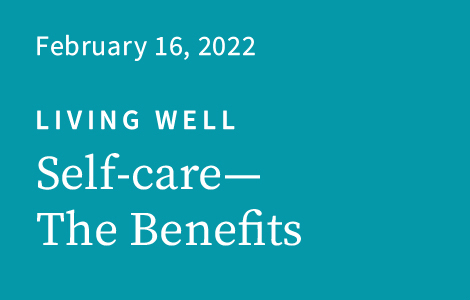Transcript
Self-care—The Benefits
Felicia: I’ve been working at the Penn Memory Center supporting caregivers taking care of somebody with Alzheimer’s disease or related dementias for about 10 years or so, so I have hundreds of people who I have worked with over the years. I want to share a couple of stories today, about two people in particular, and I am changing the names to protect the folks’ identities. The first person I’m going to tell you about is a woman named Mariana, and Mariana has been caring for her husband, John, for just about a year, or slightly over a year. Mariana first reached out to me upon hearing John’s diagnosis, which was early-stage Alzheimer’s disease, and she told me she wanted to meet just so that she could learn all she could about the diagnosis. We met a couple of times, and at my recommendation she enrolled in our seven-week class called Caring for the Caregiver. This is a class that focuses on self-care for caregivers in order to improve the outcomes for their loved ones living with dementia. Mariana was highly engaged and participated actively in our class discussions, and at the conclusion of the class she joined a caregiver support group. She loved the group, but she still felt she needed a little bit more support, so she reached out to me for individual therapy, and we’ve been meeting every other week or so for the past year or so. Our work has been really on helping Mariana understand how her husband’s illness affects his thoughts, his behaviors, and his functioning, but we also place an emphasis on Mariana’s self-care. Some of the ways in our work together that Mariana has developed self-care strategies are that she’s been reaching out to family and friends to schedule outings for her husband and getting someone to pick him up so that he doesn’t have to drive and take him out to lunch or to do something he enjoys. It gives her some time to be by herself or to have lunch with a friend and occasionally get away for a long weekend. Mariana is really good about exercising and going to her doctor’s appointments because she knows that ultimately her husband’s care is on her, and she needs to prioritize her self-care so that she can care for him. In our sessions we work on mindfulness meditation and mindful breathing, and Mariana practices between sessions as a way to reduce her stress and anxiety and to stay in the moment. Finally, Mariana has been really proactive about planning for their future. She’s not currently looking for alternative living arrangements, but she is kind of starting the process of just seeing what’s out there if and when the time comes when they decide that a move is necessary for them. While Mariana admits to feeling sad from time to time, she does have a sense of mastery in her role as a caregiver and feels more positive about her situation overall.
The other person I’d like to talk about is a man who I will call Jerome. Jerome’s wife wasn’t a patient of ours, and she didn’t really have a diagnosis yet, but she was really having some difficulty with functioning, and he was noticing some behavioral changes. At a friend’s request he signed up for my caregiver class, so I met him in that context. His wife, Angela, was a retired medical professional, and sometimes those make the worst patients. She didn’t want to go to the doctor and refused kind of getting a workup to figure out what might be going on with her memory and thinking. Jerome came to each class late looking exhausted and overwhelmed. He complained about how hard it was to get there because his wife was really paranoid and didn’t like whenever he left the house. This is a couple without a lot of family or support, so it was really just the two of them. They are pretty isolated. Jerome was reluctant to try some of the self-care techniques that we taught in class, and he was skeptical that any of the behavioral or communication strategies that we taught would help him. He found endless reasons why nothing would help. His wife used to be the cook in the family, and now the food prep was all on him, so he resorted to takeout and sandwiches and was neglecting his own exercising and rarely got breaks from caregiving. His wife would rage at him, and rather than walk away or redirect her he kind of fought back with her, and their stress level was high. Angela was eventually diagnosed with behavioral variant frontotemporal dementia, and Jerome struggled to separate her behaviors from her disease and continued to try to reason with her despite knowing that it wasn’t the best strategy. Jerome at one point needed knee replacement surgery, but postponed that because he wasn’t comfortable leaving his wife in anyone else’s care. They increasingly grew more isolated, and stress and depression continued to increase for Jerome. At this point his wife is on hospice, and he continues to struggle with depression in anticipation of the loss of his wife. So those are two stories that I wanted to share, one kind of demonstrating positive self-care, and the other one with somebody who struggled a little bit more.
Barry: What’s really common to both of those cases is that you had real commitment on the part of both caregivers. It wasn’t as if one person didn’t want to do the work and the other did. They both wanted to help their loved one. I always talk about how important it is to approach caregiving in a smart and strategic way, and smart and strategic caregiving includes self-care. I have talked with many caregivers over the years who seem disinclined to care for themselves. They feel guilty caring for themselves, and consequently they resisted. So I think those two cases are very emblematic of how a lot of caregivers either take care of themselves or don’t.
Self-care is really important as I think all of us know, and if there’s one thing that people who are helping caregivers talk about, it is self-care. Just to talk about why it is so important, we have a lot of research over the years about what happens to caregivers when they don’t take care of themselves, so just to cite a couple of different research statistics which I think are compelling, the most famous research article in the family caregiving literature was a Journal of the American Medical Association article from 1999 that was primarily written by a social psychologist at the University of Pittsburgh named Rick Schulz. What he found is that he looked at older adults who were caring for spouses who had dementia, and a lot of these older adults themselves had chronic illnesses. Like many older adults they had hypertension and diabetes, and what Rick Schulz found is that these older adults were so focused on caring for their loved ones and were so committed to their loved ones’ well-being that they neglected to take care of their own well-being. They didn’t go to the doctor for their own blood pressure checks or for their own blood sugar checks, and consequently they did poorly with their own chronic illnesses. According to Rick Schulz, they died at a 63 percent higher rate than other individuals the same age who had the same illnesses, but who were not caregivers. So in this article that came out in 1999, it really kind of let the world know that caregivers who neglect themselves put themselves at great risk for both physical consequences and medical consequences, as well as psychological consequences. Just to share some more recent statistics, every five years or so the National Alliance for Caregiving and AARP put together something called the “Caregiving in the U.S.” report, and the most recent report was published in 2020. In 2020 they surveyed something like 1,500 caregivers who were a representative sample of the United States, and they found that of those caregivers 21 percent of them said that their health was fair or poor, meaning that their health was not really what we would want it to be. That’s a lot of caregivers who were self-rating as having poor health, and this is in comparison to the U.S. population as a whole who were not caregivers, where only 12 percent of those folks said that their health was either fair or poor. So that suggests that caregivers perceive that their health is worse, and their health is probably worse oftentimes because of the stress of caregiving and possibly because they’re not taking care of themselves. I’ll also just point out that the previous time that the “Caregiving in the U.S.” report was done in 2015 the percentage of caregivers who rated their health as fair or poor was 17 percent, so between 2015 and 2020 4 percent more caregivers cited poor health. This probably has to do with the fact that caregivers are caring for loved ones with more complex and severe illnesses at home, including more severe and complex dementia. So those are two compelling statistics that I think really suggest that caregivers do really important work, but sometimes they can put themselves at risk for medical consequences unless they’re really taking good care of themselves.
Felicia Greenfield, MSW, LCSW
Executive Director
Penn Memory Center
www.pennmemorycenter.org
Barry J. Jacobs, PsyD
Principal
Health Management Associates
www.loveandmeaning.com

